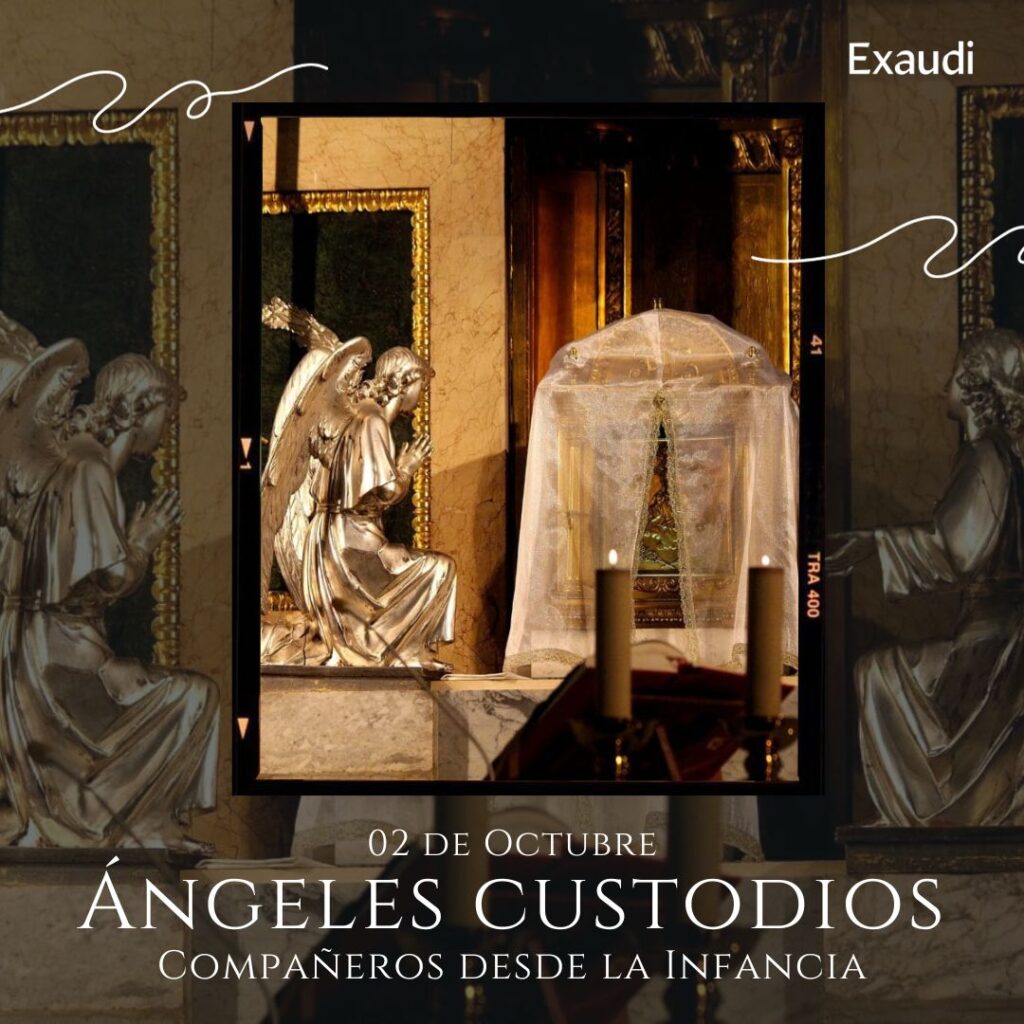Guardian angels, companions from childhood
Their feast is celebrated on October 2

The priest Carlos Gallardo offers readers of Exaudi this article on guardian angels, companions of each person from childhood, whose feast is celebrated every October 2.
***
On October 2, the Church celebrates the feast of the holy guardian angels. It was instituted for the entire universal Church in 1608, but was already present in the ecclesial tradition long before. There is a rich and abundant doctrine of the Holy Fathers on angels, supported by Sacred Scripture. We cannot forget, and the Catechism of the Catholic Church (CCC) assures us that “the whole life of the Church benefits from the mysterious and powerful help of angels” (n 334).
But who are these spiritual beings that we call angels?
The name “angel” means messenger. Their mission is to bring us a message, make divine realities present to us, and put us in God’s presence. Those who transmit messages of lesser importance are called angels, and those who transmit messages of greater importance are called archangels.
Christ is the centre of the world of angels; they have been created by Him and for Him. From the moment of Creation, throughout history we find them announcing Salvation. That is why the life of man has been surrounded and continues to be surrounded by their protection and intercession. The work of angels ultimately depends on their relationship with God and with Jesus Christ. They participate in divine life, they enjoy the beatific vision. That is why, by honouring them, we honour God himself. They are united to Jesus, and their company and intercession leads us to Jesus. They are our brothers angels in the order of Grace, they are interested in our salvation. Saint Paul reminds us that angels are at the service of God and are sent as servants for the good of those who are to receive the inheritance of Salvation. Angels present our prayers to God and defend us from the snares of the evil enemy and his angels.
In the living tradition of the Church, it is firmly believed that each child of God, being a “temple of God,” has an angel designated for our protection. Thanks to this guardian angel, we are in full communication with divine realities, with heaven. Our guardian angel is constantly contemplating the face of God and at the same time our own. He unites the human with the divine. We must show our guardian angel veneration, trust, and love. A veneration when we greet him, when we become aware that he lives with me and at the same time he is contemplating the face of God. We must also honor him with profound trust because he has the power to protect us and at the same time brings us closer to the goodness of God.
Let us not be afraid of temptations, struggles, or hesitations. We can speak to our guardian angel and he, especially in moments of temptation, will defend and protect us. The saints lived with this profound conviction. Saint Padre Pio of Pietrelchina had a very close relationship with his guardian angel. But also with the guardian angels of those he cared for spiritually. He used to tell his spiritual leaders that if they needed him, he would send them their guardian angel to warn them.
Let us become aware of this supernatural life that develops among us, barely perceptible, but nevertheless very real. Let us turn to these companions on the journey who have been with us since early childhood. There is a prayer written by the monk Macarius (an Egyptian monk), dated in the year 390, addressed to the guardian angel. When reciting this prayer, may we feel in a special way the protection of the one who comes to bring me to God, who comes to introduce me to the sphere of the sacred. This prayer goes like this:
“Holy Angel, who watches over my poor soul and my life, do not leave me – I am a sinner – and do not forsake me because of my stains. Do not let the evil spirit approach me. And guide me powerfully, preserving my mortal body. Take my weak hand and lead me on the path of salvation. Amen.”
Sources: Catechism of the Catholic Church, Compendium of Ascetic and Mystical Theology by A. Tanquerey.
Related

Overcoming Emotional Dependence: A Guide with Psychologist Mónica Caballero
Proyecto Ánima
28 March, 2025
2 min

Addictions and Sexuality
José Miguel Ponce
28 March, 2025
2 min

The Chosen: A Series That Wins Hearts in Its Own Language
Mar Dorrio
27 March, 2025
4 min

Being a Christian of One Piece: Integrity and Coherence in the Life of Faith
Patricia Jiménez Ramírez
26 March, 2025
2 min
 (EN)
(EN)
 (ES)
(ES)
 (IT)
(IT)

